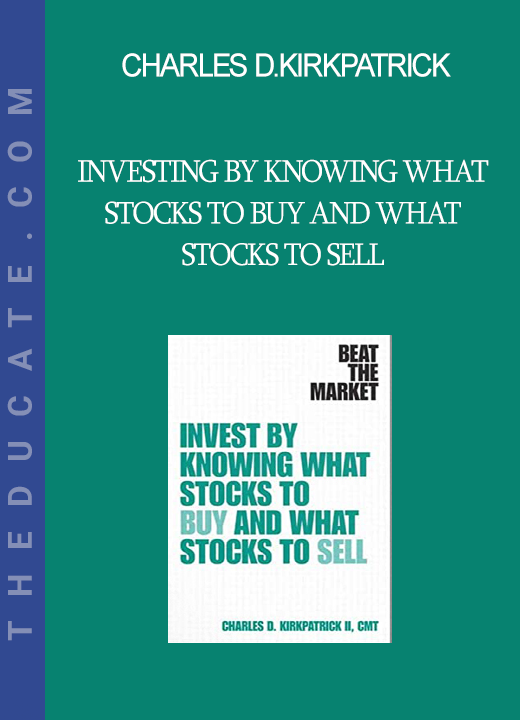Description
Charles D.Kirkpatrick – Investing By Knowing What Stocks to Buy and What Stocks to Sell
“The author introduces an investing methodology with proven results and easily applied unequivocal decision making. Particularly impressive is the way he includes a selling discipline, not just a buying discipline. This book is a must for any concerned investor.”
Richard Arms, Analyst, Author, and Inventor of The Arms Index
“This is one of the best new investing books of the decade: succinct, practical, and timeless. Built on a foundation of 40 years of market wisdom, it combines technical analysis and portfolio construction that is supported by excellent research. It should be required reading for everyone from new investors to the most sophisticated hedge fund managers.”
Linda Raschke, President, LBRGroup, Inc.
“The author is an award winning Technical Analyst. In this book, he covers the basic principles, definitions, safeguards, pitfalls, and risks of investing. Believing in active management, he recognizes the benefits of multiple tools (fundamental and technical) and disciplines there-on, to construct a portfolio methodology with guidelines for both buying and selling, for maximum gain. This is a valuable book for any serious investor.”
Louise Yamada, Managing Director, Louise Yamada Technical Research Advisors, LLC.
“In this book, Charles Kirkpatrick demonstrates just how powerful a tool relative strength is, deftly combining technical and fundamental analysis to produce a superior long-term approach. This isn’t just theory, but the real-time work of a practitioner with an outstanding track record. For many years a small group of knowledgeable investors has known about this work, now you can too.”
John Bollinger, CFA, CMT, President, Bollinger Capital Management
“The author presents a clearly written, time-tested formula for investor independence and success through applying relative price strength for stock selection and portfolio construction.”
Hank Pruden, Golden Gate University
Over the past 25 years, Charles D. Kirkpatrick’s exclusive stock-picking technique has outperformed the S&P 500’s performance by a whopping 7.7 times. That’s right: If you’d invested $10,000 in the S&P 500, you’d have $130,000 now…but if you’d followed Kirkpatrick’s published picks, you’d have $1,000,000! If that’s not amazing enough, Kirkpatrick’s system is remarkably easy to use. In this book, he teaches you all you need to put it to work in your portfolio!
Kirkpatrick reveals why an active strategy based on relative stock rankings is the surest route to profit, and how just a few pieces of publicly available information enable you to create rankings that virtually guarantee exceptional performance. You’ll learn how to use his techniques to organize stocks into a portfolio that maximizes returns while reducing risk…uncover trigger points that tell you when to buy and sell…and systematically protect yourself against bad stocks and bad markets.
- Why the conventional wisdom about investing is flat-out wrong
What’s wrong with diversification, “random walks,” and the efficient markets hypothesis - Don’t even try to predict the markets: you don’t have to!
Discover what the markets are actually doing: then react fast, with discipline - Invest the intelligent way: with “relatives”
Measure what really matters: a stock’s relative strength and growth compared with the rest - Start using the market’s reliable investment triggers
Recognize what to buy, what to sell, and when to make your moves - Mitigate the risks associated with broad market declines
Intelligently decide when to move assets into cash
Stock trading course: Learn about Stock trading
A stock trader or equity trader or share trader is a person or company involved in trading equity securities.
Stock traders may be an agent, hedger, arbitrageur, speculator, stockbroker.
Such equity trading in large publicly traded companies may be through a stock exchange.
Stock shares in smaller public companies may be bought and sold in over-the-counter (OTC) markets.
Stock traders can trade on their own account, called proprietary trading, or through an agent authorized to buy and sell on the owner’s behalf.
Trading through an agent is usually through a stockbroker. Agents are paid a commission for performing the trade.
Major stock exchanges have market makers who help limit price variation (volatility) by buying and selling a particular company’s shares on their own behalf and also on behalf of other clients.






Reviews
There are no reviews yet.